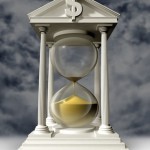 So far in this presidential election cycle I have seen both Gary Johnson and Ron Paul bluntly declare that the most serious problem we faced as a nation was that we are bankrupt. After hearing this comments I started reflecting on the nature and effects of bankruptcy, and if we are actually bankrupt as a nation.
So far in this presidential election cycle I have seen both Gary Johnson and Ron Paul bluntly declare that the most serious problem we faced as a nation was that we are bankrupt. After hearing this comments I started reflecting on the nature and effects of bankruptcy, and if we are actually bankrupt as a nation.
For corporations, bankruptcy is declared when the company cannot pay its debts as they fall due. It doesn’t mean that the company is worthless; in fact, bankrupt companies can have assets valued in the billions of dollars, and these assets don’t simply disappear because a company files for bankruptcy protection. What actually happens is that ownership rights to these assets are shifted from the company to the creditors. In essence, the company’s property is transferred from the shareholders to the bondholders who, because they provided credit by buying bonds, hold preferred rights regarding payments, are entitled to basically repossess the capital of the company upon bankruptcy.
Our government might still be making interest payments on the debt (a factoid used by PolitiFact to declare the statements made by Congressman Paul and Governor Johnson to be false) , but our economy itself is being repossessed by our creditors – foreign companies who, with financing from banks holding trillions of dollars in US currency reserves, are all too happy to purchase tangible American assets.
The United States government may not fit the technical definition of bankruptcy because it is making its current debt payments, but behind the semantics of defining bankruptcy precisely the effects on our economy are the same; the valuable assets of the United States are shifting in ownership – from “shareholders†(American investors) to our “bondholders†(foreigners holding US dollar reserves). Anybody who holds US currency as a reserve is essentially a creditor of the United States, and they are coming to collect.
Few Americans have ever heard of the company Deutsche Börse AG, yet this German company is in the middle of a deal to take over the New York Stock Exchange. The deal, while set up to look like a merger, will make the German trading company the largest financial markets management company in the world.
This isn’t the only example either. In 2008, Anheuser-Busch was purchased by InBev, a conglomerate of Belgian and Brazilian companies, and shortly after the deal, InBev’s line of beers made an en masse appearance in wine and spirits sections in grocery chains around the country.
More recently there is the story of Nexteer, the Michigan-based automotive parts manufacturer purchased by a Chinese capital firm. It is anyone’s guess whether the Chinese investors were interested in Nexteer’s factories and supply network or in Nexteer’s nearly 1,000 registered patents.
The purchases aren’t limited to companies, either. An Australian-Spanish partnership purchased leases to the Indiana Toll Road and the Chicago Skyway.
And, the Chinese energy giant CNOOC has purchased huge stakes in the energy exploration projects of Chesapeake Energy, which holds hundreds of thousands of acres of oil and gas fields in Texas and elsewhere.
None of this should be terribly surprising; after a decades-long consumption binge, the American people are collectively buried in debt, and have little or no savings remaining. With so little savings, the American economy does not have the capital required to own capital assets, including companies.
Other countries are not hobbled in this manner. Economies that are more inclined towards production and savings and less enamored with the lure of consumer credit than the American economy of the last twenty or so years now have very deep capital pools from which to draw, and the lingering crisis in the United States is making our assets cheap. Foreign savers have been unleashed on America. The largest garage sale in history has begun.
The only way for this trend to reverse is for Americans to start saving again. Investments require capital, and that capital comes from savings. We need to adjust our thinking away from credit-financed consumption and towards capital investments and wealth-building. But, then again, easy credit has become as American as apple pie and SlimFast – a brand owned by Unilever, a Dutch company.



